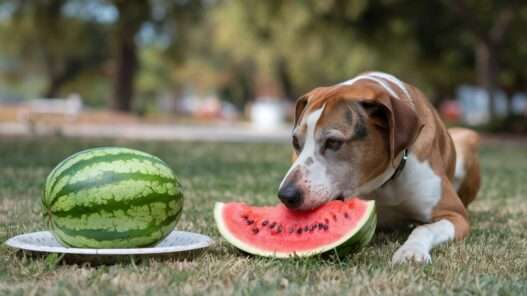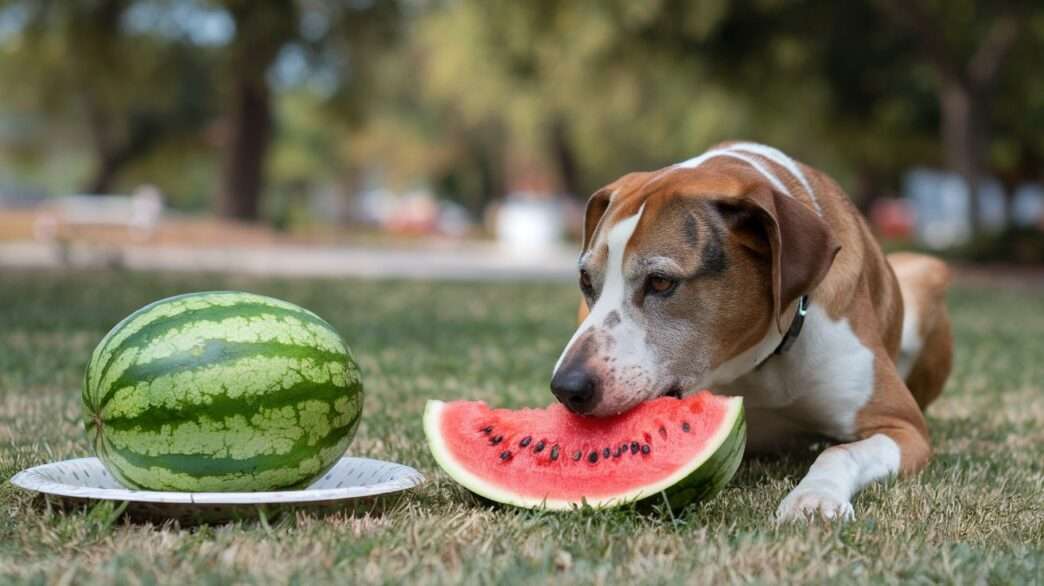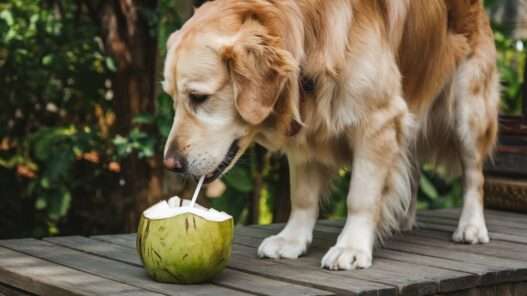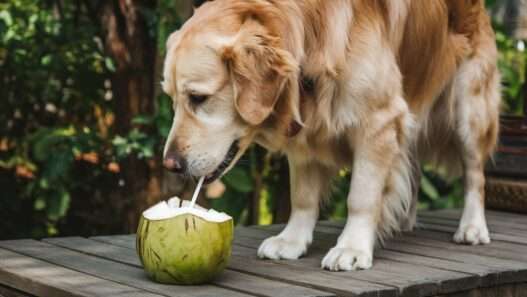Dogs should not eat watermelon rind. While the flesh of watermelon is safe and healthy for dogs in moderation, the rind can be problematic for several reasons:
– Digestive Issues: The rind is tough and difficult for dogs to digest. Consuming it can lead to gastrointestinal upset, including vomiting, diarrhea, and abdominal discomfort.
– Choking Hazard: Watermelon rind can be difficult for dogs to chew properly, posing a choking risk or causing blockages in the digestive tract.
– Potential for Blockages: Large or indigestible pieces of rind can lead to blockages in the intestines, which might require veterinary intervention.
To safely share watermelon with your dog, remove the rind and seeds, and offer only small amounts of the flesh. Always monitor your dog for any adverse reactions and consult your veterinarian if you have concerns about their diet or if they accidentally consume watermelon rind.
Is watermelon good for dogs?
Watermelon can be a healthy treat for dogs when offered in moderation. The fruit is low in calories and packed with beneficial vitamins and hydration, as it consists of over 90% water. It provides vitamins A, B6, and C, which can support overall health and immunity. However, it’s important to remove the seeds and rind before giving watermelon to your dog. The seeds can pose a choking hazard or cause intestinal blockages, while the rind is difficult to digest and can lead to gastrointestinal issues. When given as an occasional treat and in small, manageable pieces, watermelon can be a refreshing and nutritious snack for dogs.
Can dogs have watermelon?
Dogs can safely enjoy watermelon in moderation, as it offers several health benefits. Watermelon is a low-calorie fruit with a high water content, which helps keep dogs hydrated, especially during hot weather. It also contains beneficial nutrients like vitamins A, B6, and C, which can support a dog’s overall health and immune system.
However, it’s essential to prepare watermelon properly before offering it to your dog. Always remove the seeds, as they can pose a choking hazard or potentially cause intestinal blockages. Similarly, the rind should be avoided because it is difficult for dogs to digest and can lead to gastrointestinal issues such as vomiting or diarrhea.
When feeding watermelon to your dog, offer it in small, manageable pieces to reduce the risk of choking and ensure they can digest it comfortably. Introduce it gradually to monitor for any adverse reactions, and only provide it as an occasional treat rather than a regular part of their diet.
If you have any concerns about how your dog might react to new foods or if they have specific health conditions, consult your veterinarian for personalized advice. This way, you can safely incorporate watermelon into your dog’s diet while ensuring their overall well-being.
Watermelon for dogs:
Watermelon can be a healthy treat for dogs when given in moderation. It is hydrating and packed with vitamins A, B6, and C. However, always remove the seeds and rind before offering watermelon to avoid choking hazards and digestive issues. Serve it in small, manageable pieces, and introduce it gradually to monitor for any adverse reactions. As with any treat, moderation is key, and consult your vet if you have any concerns.
Is watermelon ok for dogs?
– Safe in Moderation: Watermelon is safe for dogs when given in small amounts.
– Hydrating and Nutritious: It’s high in water and provides vitamins A, B6, and C.
– Remove Seeds and Rind: Seeds can cause choking or blockages; rind can lead to digestive issues.
– Serve in Small Pieces: Offer manageable portions to avoid choking and ensure digestibility.
– Monitor for Reactions: Watch your dog for any adverse effects when introducing new foods.
Is watermelon safe for dogs?
Yes, watermelon is generally safe for dogs when given in moderation. It’s hydrating and packed with vitamins A, B6, and C. However, be sure to remove the seeds and rind before offering it, as these can cause choking or digestive issues. Serve it in small, manageable pieces and monitor your dog for any adverse reactions.
Dogs and Watermelon:
Dogs can enjoy watermelon as a healthy treat in moderation. It’s a great way to keep them hydrated due to its high water content and provides beneficial vitamins like A, B6, and C. However, it’s important to remove the seeds and rind before giving watermelon to your dog. The seeds can be a choking hazard and might cause intestinal blockages, while the rind is difficult for dogs to digest and can lead to gastrointestinal issues. Always serve watermelon in small, manageable pieces and watch for any signs of digestive upset. Offering watermelon occasionally and in appropriate amounts can be a refreshing and nutritious treat for your dog.
Is watermelon bad for dogs?
Watermelon is not inherently bad for dogs and can be a healthy treat when given in moderation. It is hydrating and provides beneficial vitamins like A, B6, and C. However, the seeds and rind should be removed before offering watermelon to your dog. Seeds can pose a choking hazard or cause intestinal blockages, while the rind is difficult to digest and may lead to gastrointestinal upset. As long as these precautions are taken and watermelon is served in small, manageable pieces, it can be a refreshing and safe treat for your dog.


























